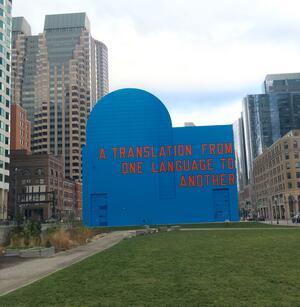Sharing Our Stories
I grew up bilingual. From a young age, my parents, who are not Israeli, spoke to me in Hebrew because they felt it was an important skill to have. My ability to communicate with people outside of the English-speaking world has always felt like an incredible privilege. Although I love being able to find deeper meaning in the things I say through my dual-vocabulary, it’s the ability to share stories with people who otherwise wouldn’t be able to understand them, and the ability to hear theirs, that I find most important. Chimamanda Ngozi Adichie is a Nigerian-American author, who, like me, is bilingual. Through her writing, she shares stories with me about people I’d otherwise never be able to understand. Although Adichie is probably most commonly known for her appearance in Beyonce’s Flawless, I’ve recently been inspired by her in many ways. Most significantly, I’ve been inspired by her beautiful, quiet, productive form of political activism.
Adichie’s love of language is clear in her writing as she switches back and forth between English and Igbo. Adichie’s book, Americanah, tells the story of a woman who comes from Nigeria to the United States to pursue her dreams. One thing her protagonist is struck by is the racial divide in this country. Through the lens of realistic fiction, Adichie manages to give a shocking description of blackness in America, explaining easily and clearly that no matter how hard we try, there is an ingrained racism that we all posses, and it’s a demon we must work to conquer within ourselves. She uses her protagonist to humanize the beast that is institutionalized racism, giving the reader access to a kind of empathy that is only accessible through the story of a life.
Writing fiction is an uncommon form of activism; we usually think about activism in the form of protests and boycotts. However, the importance of storytelling is not to be minimized, because stories help us to develop empathy, which is not an easy thing to do. It’s easy to understand that human rights are important, but it’s a whole other thing to understand the reality of why they are. On a basic level, we’re all in agreement; people deserve their freedoms and their safety. However, interacting with real stories and real people is what compels us to put in the work it takes to make universal human rights a reality.
Social media has played an important role in the advancement of this type of political activism. Humans of New York’s Brandon Stanton has spent much time, within the city and overseas, exploring people’s stories and sharing insights into their lives. In doing so, Stanton, like Adichie, humanizes those who may otherwise seem like just a news story. For example, Stanton has recently spent a significant portion of time photographing Syrians seeking refuge in the United States. Through his work, the devastating situation of those in Syria is given a face. This face, this human connection, is a necessary humanization that leads to empathy, and it’s that empathy that leads to change.
Humans of New York is just one example of a way in which stories can be used to make change. In Adichie’s Ted Talk entitled The Danger of a Single Story, she addresses a time in her life when she allowed a single thing she knew about someone to become her entire understanding of them. Using this story, she passionately conveys the danger in only knowing one aspect of a person, country, or group of people, and allowing that to fully dictate one’s understanding of them. Telling stories is political activism in its own right. Without language and without stories, the world could only ever be run by those closest to the media and those with the most money. It’s our voices, our writing, and our vote that create a nuanced picture of humanity, and helps make this world a better, and more empathetic place.
From the streets of New York City to the streets of Lagos, from the Israeli-Palestinian conflict to the halls of my high school, I have learned that understanding people on a personal level is the only way to work through conflict. The human experience, with its exceptional variety, also has extraordinary similarities, and it is by sharing stories that we begin to find our common thread. Sharing the story of what it means to be Nigerian and what it means to be African in America is Adichie’s way of doing just that.
Adichie is someone I’d love to meet. If I was able to get over being completely star-struck, I’d love to ask her about Nigeria and hear her story directly, and I’d love to get her thoughts on my writing. Adichie has taught me to seek out the stories of others. She’s taught me to never form an opinion before gathering all the facts. And she’s taught me the significance of activism through writing.
This piece was written as part of JWA’s Rising Voices Fellowship.







